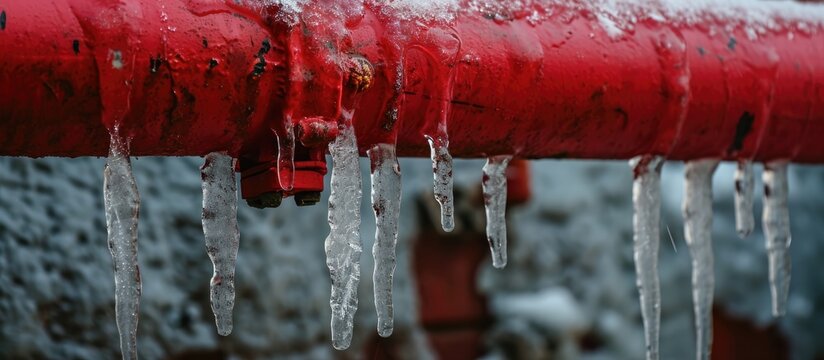We've come across this post about Preventing and dealing with frozen pipes down the page on the net and think it made good sense to discuss it with you over here.

Cold weather can wreak havoc on your pipes, specifically by freezing pipes. Below's just how to prevent it from happening and what to do if it does.
Intro
As temperature levels decline, the risk of icy pipes boosts, possibly bring about pricey fixings and water damage. Recognizing exactly how to avoid frozen pipes is important for property owners in cool environments.
Prevention Tips
Insulating susceptible pipelines
Wrap pipes in insulation sleeves or utilize warm tape to protect them from freezing temperature levels. Focus on pipelines in unheated or external locations of the home.
Home heating strategies
Maintain interior spaces effectively warmed, specifically locations with plumbing. Open closet doors to permit warm air to flow around pipelines under sinks.
Exactly how to recognize frozen pipes
Search for lowered water flow from faucets, unusual smells or sounds from pipelines, and visible frost on subjected pipelines.
Long-Term Solutions
Structural adjustments
Take into consideration rerouting pipes far from exterior walls or unheated locations. Include extra insulation to attic rooms, cellars, and crawl spaces.
Upgrading insulation
Purchase top quality insulation for pipelines, attic rooms, and wall surfaces. Proper insulation assists preserve constant temperature levels and lowers the risk of frozen pipelines.
Safeguarding Exterior Pipes
Yard hose pipes and outside taps
Separate and drain garden hose pipes prior to winter. Install frost-proof faucets or cover exterior taps with insulated caps.
Understanding Frozen Pipelines
What creates pipelines to freeze?
Pipes ice up when revealed to temperature levels listed below 32 ° F (0 ° C) for prolonged periods. As water inside the pipes ices up, it increases, putting pressure on the pipeline walls and possibly causing them to rupture.
Risks and damages
Icy pipes can bring about supply of water disturbances, building damage, and costly fixings. Burst pipes can flood homes and trigger substantial architectural damages.
Indications of Frozen Pipeline
Identifying icy pipelines early can avoid them from bursting.
What to Do If Your Pipes Freeze
Immediate activities to take
If you believe frozen pipelines, maintain faucets open up to ease pressure as the ice thaws. Use a hairdryer or towels taken in hot water to thaw pipes slowly.
Conclusion
Stopping frozen pipelines calls for proactive actions and fast feedbacks. By understanding the causes, indications, and safety nets, home owners can safeguard their plumbing during winter.
Helpful Tips to Prevent Frozen Pipes this Winter
UNDERSTANDING THE BASICS: WHY PIPES FREEZE AND WHY IT’S A PROBLEM
Water freezing inside pipes is common during the winter months, but understanding why pipes freeze, and the potential problems it can cause is crucial in preventing such incidents. This section will delve into the basics of why pipes freeze and the associated problems that may arise.
THE SCIENCE BEHIND FROZEN PIPES
When water reaches freezing temperatures, it undergoes a physical transformation and solidifies into ice. This expansion of water as it freezes is the primary reason pipes can burst. As the water inside the pipe freezes, it expands, creating immense pressure on the walls. If the pressure becomes too great, the pipe can crack or rupture, leading to leaks and water damage.
FACTORS THAT CONTRIBUTE TO PIPE FREEZING
Low Temperatures: Extremely cold weather, especially below freezing, increases the risk of pipes freezing. Uninsulated or Poorly Insulated Pipes: Pipes located in unheated areas, such as basements, crawl spaces, or attics, are more prone to freezing. Insufficient insulation or lack of insulation altogether exacerbates the problem. Exterior Wall Exposure: Pipes running along exterior walls are susceptible to freezing as they encounter colder temperatures outside. Lack of Heating or Temperature Regulation: Inadequate heating or inconsistent temperature control in your home can contribute to frozen pipes. PROBLEMS CAUSED BY FROZEN PIPES
- Pipe Bursting: As mentioned earlier, the expansion of water as it freezes can cause pipes to burst, resulting in significant water damage.
- Water Damage: When pipes burst, it can lead to flooding and water damage to your property, including walls, ceilings, flooring, and personal belongings.
- Structural Damage: Prolonged exposure to water from burst pipes can compromise the structural integrity of your home, leading to costly repairs.
- Mold and Mildew Growth: Excess moisture from water damage can create a favorable environment for mold and mildew growth, posing health risks to occupants.
- Disrupted Water Supply: Frozen pipes can also result in a complete or partial loss of water supply until the issue is resolved.
WHY CERTAIN PIPES ARE MORE PRONE TO FREEZING
- Location: Pipes located in unheated or poorly insulated areas, such as basements, crawl spaces, attics, or exterior walls, are at higher risk of freezing.
- Exterior Pipes: Outdoor pipes, such as those used for irrigation or exposed plumbing, are particularly vulnerable to freezing as they are directly exposed to the elements.
- Supply Lines: Pipes that carry water from the main water supply into your home, including the main water line, are critical to protect as freezing in these lines can affect your entire plumbing system.
- Underground Pipes: Pipes buried underground, such as those connected to sprinkler systems or outdoor faucets, can be susceptible to freezing if not properly insulated.
https://busybusy.com/blog/helpful-tips-to-prevent-frozen-pipes-this-winter/

Hopefully you enjoyed reading our section about 6 Ways to Prevent Frozen Pipes. Thank you for spending some time to read our posting. Loved our article? Please share it. Help others discover it. Thanks a lot for your time. Kindly visit our site back soon.
Schedule A Service